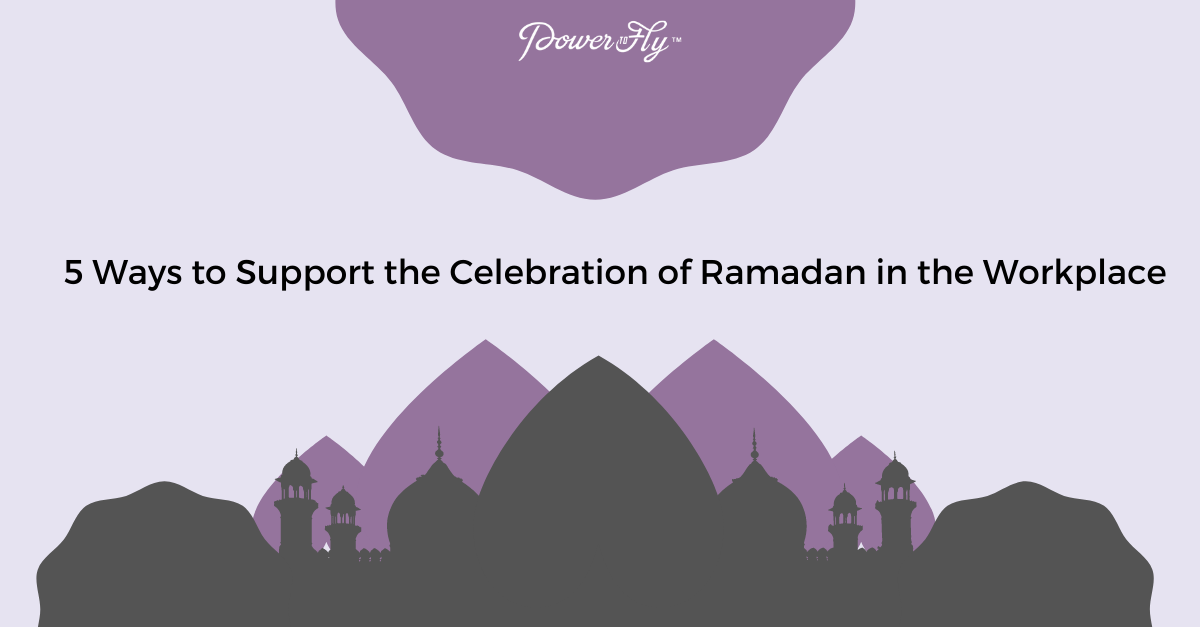Ramadan is the holiest month in the Islamic calendar, and it’s also a wonderful opportunity to strengthen the culture of inclusivity in the workplace.
This annual month-long holiday is a time that requires accommodation and understanding, flexibility and support, and encouragement of open religious observation for Muslim colleagues. This is why many companies have made these a priority in their workplaces, during Ramadan and beyond.
So, what are the best ways to support Muslim coworkers during this holy month?
First, you should learn what it is, and the importance of this month-long holiday in Islam. Keep reading to learn more, and for 5 ways you can support the celebration in your workplace.
What is Ramadan?
In order to understand the best ways to support it’s celebration, we must first understand what Ramadan is and its significance in Islam.
The Yaqeen Institute for Islamic Research describes Ramadan as “the period in which the Prophet Muhammad (peace be upon him) was visited by the archangel Gabriel and began to receive the Qur’an—the final scripture revealed by God.”
To commemorate this great revelation, participants abstain from food and drink from sunrise to sunset. This means that they don’t eat or drink anything between these periods – even water. This fast, along with other ways of celebrating, brings spiritual clarity and a reconnection with the Divine.
Every day of Ramadan begins with suhoor, the meal taken before sunrise, and then ends with iftar, the meal taken after sunset, with communal prayers at the end of each day and then personal prayers throughout the night.
While fasting is likely the most characteristic practive of Ramadan, it is also a time of bonding between family and community, a time of prayer, a time of charity, and a time of avoiding bad habits (such as smoking).
Outside of the fast and communal prayers, each individual may celebrate Ramadan in their own way. This is why having an accommodating workplace is such an important aspect during this sacred month.
Ways to Support Ramadan at Work
1. Allow flexible and thoughtful work schedules
Between nighttime prayers, early morning suhoor, and daily fasting, it is not unusual for Muslim employees to feel fatigued and experience loss of concentration during Ramadan. In fact, Harvard Health states that fasting can cause lethargy, headaches, and crankiness. This is why offering a more flexible schedule can be one of the best forms of support.
For instance, allowing Muslim employees to begin earlier in the day, so that they can leave earlier to enjoy iftar with their families, is a great option to give. This ensures they can work during the peak of their energy (after their morning meal) and return home to celebrate the breaking of their fast for the day.
For Muslim employees that work late or night shifts, allowing them breaks during work to enjoy iftar at sunset, or to eat suhoor at sunrise, as well as flexibility for prayer, is another great option to give.
Offering flexible hours also allows those who celebrate through means of charitable work to volunteer during the day without worrying about it interfering with their work schedule.
2. Offer designated prayer spaces
Prayer is an important aspect of Islam, but it is especially necessary during Ramadan. Some participants may pray up to five times a day, each session taking 5-10 minutes. And some may require a designated prayer space in the workplace.
Helpful accommodations could include a specific room set aside for employees to use for prayer, meeting rooms that employees can book for prayer times, or even allowing them to visit a local mosque.
Leaving these prayer options open for Muslim employees year-round is a great way to support those who practice these prayers even outside of Ramadan.
3. Offer enough paid time off
Many Muslim employees use Ramadan as a means of reconnecting with family and dedicating their time to charities, so offering adequate amounts of PTO offers them the freedom and ability to take the days off that are most important to them during their celebration.
Whether it's family or community get-togethers, time with friends, volunteer work, or even adjusting to new sleeping and eating schedules, offering plenty of PTO during the month of Ramadan ensures all Muslim employees are able to celebrate the holiday to its fullest.
It also gives them the opportunity to celebrate Eid al-Fitr, or the Feast of Breaking the Fast.
This significant, three-day holiday marks the end of Ramadan and is typically comprised of praying, charity, relaxing, feasting, drinking, and gifts. It is often likened to Christmas for Christians, and Muslim employees will want adequate time off to enjoy the festivities and food with their friends and family.
4. Partake in fasting or eat consciously
The Yaqeen Institute of Islamic Research encourages non-Muslims (who are interested) to try their hand at Ramadon’s intense sunrise-to-sunset fasting. And what better way to connect with Muslim coworkers?
While fasting for non-Muslims during Ramadan is not required, it is a meaningful act of inclusion that can help Muslim colleagues feel a sense of community, safety, and belonging in the workplace. Firsthand experience also offers the best form of education and empathy.
If fasting sounds too intense, it can be equally as kind to avoid food-centered meetings (such as luncheons), to not offer them food (accidentally), and to not eat in front of them during their fast (Note that many participants are not bothered by others maintaining a normal food schedule, so to avoid any offenses, it’s best to ask before eating in front of them).
Being conscious of one’s actions is always important in the workplace, but taking a little extra care during Ramadan can be very meaningful.
5. Provide education to raise awareness
One of the best means of creating support for Muslim employees during Ramadan is by providing education on Ramadan’s significance, history, and traditions to raise awareness in the workplace.
Coworkers might want to know how to wish someone a happy Ramadan, be more respectful during a spiritually significant time, or may wonder how they can best support Muslim colleagues throughout the month. Hosting an educational talk on Ramadan can teach them all of these things and help build a more positive, inclusive atmosphere for Muslim workers.
While Ramadan is an especially great time to build religious inclusivity, supporting Muslim workers throughout the year is equally as important. For many, spiritual fervor does not end with Eid al-Fitr, and being open to understanding and accommodating different religious practices is an important part of cultivating a culture of inclusivity.
Ramadan is a great opportunity to bring education about religious diversity to the workplace and to remind people that even in the professional realm, religion still plays a very important role in people’s daily lives. Only with this understanding can a healthy, safe work environment be created that allows religious diversity to flourish.
Click here to see what companies are doing to support their Muslim employees this month.




